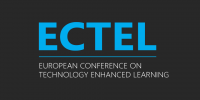
Twentieth European Conference on Technology Enhanced Learning
Two Decades of TEL: from Lessons Learnt to Challenges Ahead
Newcastle and Durham, UK, 15-19 September 2025
Conference Theme
Two Decades of TEL: from Lessons Learnt to Challenges Ahead
Throughout the past two decades, TEL has developed as a research bridge between educational psychology and practical pedagogy on the one side and innovative digital technologies on the other. It has been influenced by technological advancements, societal transformations and evolving educational needs. Yet it has maintained its own identity of an innately interdisciplinary field, which is informed by theory and focused on practice, which seeks to integrate correct technological solutions with correct didactical approaches, and which advocates mindful evidence-driven research and innovation. The TEL community has always had a crucial role to play in helping students, teachers and other educational stakeholders navigate waves of innovation from online platforms to data analytics, from social media to generative AI, while responding to global challenges such as the need for lifelong learning, growing mobility and diversity of students, shortage of teachers, and the call for equity and inclusion.
This milestone conference aims to explore the key factors and critical questions that have shaped the TEL landscape and promise to influence the future of learning. What have we achieved in supporting lifelong learning, bridging formal and informal educational contexts and preparing learners for an interconnected, digital society? What technical innovations and teaching practices have stood the test of time, and what new directions of TEL research could shape the future of education? What lessons have we learned from technologies that promised to revolutionize education, but did not live up to the expectations (e.g. MOOCs) or from events and societal phenomena that have fundamentally changed our perspective on what is possible and what is expected of TEL (e.g COVID-19 pandemics). How have these experiences prepared us for future challenges and transformations (like the ones caused by the advent of Generative AI). We are interested in submissions that address not only the technological breakthroughs, but also the pedagogical, social and policy-driven advancements that have shaped the TEL field. We want to foster discussions on how TEL can continue to evolve to meet diverse learning needs, adapt to societal changes, and create sustainable, inclusive learning environments for all.
We call for submissions through research papers, demonstrations, posters, and workshops. Among regular research papers, we invite two special types of contributions that match the theme of the conference, namely the milestone papers that present a detailed account of seminal TEL research and the position papers that address an important aspect of future TEL development. In addition, the practitioner and industry track will enrich the conference with works reflecting the view of TEL stakeholders from outside the academy. Finally, a doctoral consortium will be organised to run as one of the conference satellite events, offering a platform for doctoral candidates to present and discuss their research.
Conference Topics
The topics of interest are grouped into the following six blocks:
- Pedagogical and theoretical underpinnings of TEL
- Individual factors in TEL
- Technologies supporting TEL
- Contexts of TEL
- TEL policies, ethics, and fairness
- International, national, and organisational aspects of TEL
The detailed list of topics includes, but is not limited to:
Pedagogical and theoretical underpinnings of TEL
- Active learning
- Assessment of/for/as learning
- Blended learning and flipped classrooms
- Collaborative and group-based learning
- Game-based and simulation-based learning
- Inquiry-based, exploratory, and discovery learning
- Problem- and project-based learning
- Self-regulated and self-directed learning
- Sense-making and knowledge construction
- Storytelling and reflection-based learning
- Technology-enhanced orchestration of learning
Individual factors in TEL:
- Affect and emotions
- Computational thinking and digital literacies
- Learners’ well-being
- Metacognitive concepts, processes and strategies
- Motivation and engagement
Technologies supporting TEL
- Adaptive learning support
- Augmented, virtual and mixed reality
- Educational data mining and process mining
- Generative artificial intelligence and large language models
- Interactive learning resources and smart learning content
- Interoperability and sharing of devices, tools, architectures, and data
- Learning analytics
- Mobile, wearable, and pervasive technologies
- Natural language processing
- Recommender systems
- Remote and virtual labs
- Roomware, ambient displays, and ubiquitous devices
- Sensors, sensor networks, and Internet of Things
- Serious games, simulations, and 3D virtual worlds
- Social computing and social media
- Specifications and standards
- Teaching and teachable robots and virtual agents
- Visualisation techniques and dashboards
Contexts of TEL
- Early Childhood Education
- Formal education: higher education
- Formal education: K-12
- Informal and non-formal learning
- Interprofessional and Interdisciplinary Learning
- Learning communities and communities of practice
- Lifelong learning
- Massive open online courses
- Seamless learning
- Teacher education and professionalisation
- Tutoring and individual learning
- Vocational education and training
TEL policies, ethics and fairness
- Accessibility and learning
- Digital and generational divide and learning
- Ethics, regulations, policies and strategies for handling educational data
- Fairness, equity and inclusion in learning
- Learners from underrepresented groups and learners with special needs
- Teaching and learning in rural, isolated and low-income areas
International, national and organisational aspects of TEL
- Business models and economics of education
- Global challenges
- Learner and teacher networks
- Learning ecologies and ecosystems
- Knowledge management and organizational learning
- Micro-credentials
- TEL adoption and scalability